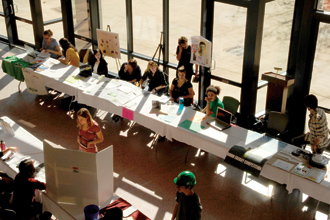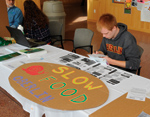Oberlin Alumni Magazine
Winter 2009-10 Vol. 105 No. 2
Waste Nothing—
Not Even a Crisis
The enviro alumni reunion brought together students past and present with ideas for the future
 (photo by Tony Morrison)
(photo by Tony Morrison)

(photo by Tony Morrison)
The first reunion of alumni interested in environmental issues brought together 150 representatives of the college and town for an October weekend that had a deceptively simple goal: to turn current economic and climate destabilization crises into opportunities to foster environmental sustainability.
Saturday morning’s panel, “Creating a Climate Neutral Oberlin,” featured Oberlin’s city manager, the president of Oberlin City Council, an electrical contractor, the superintendent of schools, and college representatives and townspeople, all literally passing around and reading from the same playbook.
Initiatives in Oberlin informed and were informed by discussions of sustainability efforts in New York City, Cleveland, and Chicago as well as by panels on real-time resource monitoring, climate change policy, and the importance of environmental history. Tours of the Jones Farm, SEED House, the Lewis Center, several sustainable businesses in Oberlin, an energy-positive home, and a botanical field trip enriched the weekend.
The program also wove in time for students to connect with alumni. On Saturday about 25 student groups, along with nine other presenters—all with a focus on environmental initiatives —crowded the Science Center’s atrium with tables of information on their projects. Alumni, students, faculty, and local residents meandered from display to display, asking questions and sharing stories.
“There’s a particular combination of intellect, innovation, ethics, hope, and dedication that describes Oberlin grads,” said Meredith Dowling ’06. “Hearing the stories and seeing the successes of the wide range of EnviroAlums in attendance helped me envision the truly enormous range of opportunities that exists for those of us who are seeking professional lives that are nourishing to ourselves and to the world around us.”
Environmental Studies Professor David Orr offered a keynote address Friday that reflected on his—and Oberlin’s—past to offer two possible futures: our society’s current trajectory toward civilization collapse, or a prosperous, post-fossil-fuel culture.
On Sunday, after a robust discussion of eight questions posed by Orr that highlighted the difficulties in creating such a culture in Oberlin, audience members broke into small groups to consider the questions related to Oberlin’s proposed Green Arts District. The consensus? While new sustainable construction is key, the entire Oberlin community must also be engaged in renovating, restoring, and building upon what is already here.
“As a recent grad, coming back to Oberlin to be surrounded again by like-minded folks was an inspiring experience,” said Dowling. “It reminded me how important it is to hold on to the idealistic dreams I developed as a student.”
